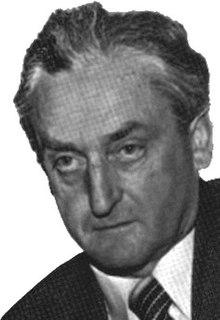Herbert Gruhl
This article includes a list of general references, but it lacks sufficient corresponding inline citations. (January 2022) |

Herbert Gruhl (born 22 October 1921 in Gnaschwitz, Saxony; died 26 June 1993 in Regensburg) was a German environmentalist and conservative politician (CDU, ÖDP). He founded the conservative environmental Ecological Democratic Party (ÖDP) in 1982.
Life[]
From 1933 to 1940 Gruhl worked as a farmer. Up from 1947 to 1952 he studied German, history and philosophy in Berlin. There he also earned a Ph.D. In 1954 Gruhl became member of the CDU. In 1969 he was elected to German Bundestag. His conservative and ecological understanding of politics made it difficult for him to feel at home in the CDU. He was one of the few environmental politicians in the CDU / CSU in the German Bundestag at the end of the 1970s. From 1975 to 1977 he was chairman of the newly founded Bund für Umwelt- und Naturschutz Deutschland (friends of the earth Germany).[1]
The differences with the party soon became that great, that he left CDU in 1978 and founded his own party GAZ, later "Green Federation" / “Colorful List”, which became later one of the founders of The Greens. After he left CDU he stood as a non-party member in Bundestag until 1980. In GAZ, with a focus on ecology he took over the chairmanship. But with the unification of different groups into The Greens, Gruhl as a consistent representative of a conservative and nature-preserving attitude, met resistance. He ran for the chairmanship of The Greens in 1981 and lost.
As an result Gruhl and his followers left the Green Party and founded ÖDP in Bad Honnef in the same year.[2] The party had his focus in Bavaria. In 1982 he was elected as chairmen of ÖDP. In 1989 he stepped back and left the party in December 1990.[1]
After he left ÖDP, Gruhl joined the right-wing conservative organization Independent Ecologists Germany (UÖD) and worked as a writer and author.
Positions[]
Gruhl's political commitment and the focus of his journalistic activities are on the protection of people and nature. In his numerous publications he took stock of the relationship between humans and the environment, its devastating effects, and called for a radical reversal.[1]
As a CDU member of the Bundestag and early growth critic, Gruhl developed and shaped the ecological debate beyond Germany like few of his contemporaries. Above all, he has repeatedly emphasized that it is not just about other technologies, but also about moderation, not just about “green growth”, but also about a cultural change. His thesis was that ecological ideas are not left, not right, but ahead.
Herbert Gruhl often was citizized due to its ties to other right-wing parties.[1][3] Towards the end of his life, Gruhl developed a very culturally pessimistic worldview. Reinhard Loske said: "He was bitter about the many futile experiences and saw no more hope. The collapse caused by the ecological crisis unfortunately had something inevitable for him in the end."[4]
Loske mentioned in 2020 Gruhl achievements as the author of one of the most important German books on the global environmental crisis (“A Planet is Plundered” from 1975), as BUND chairman, opponent of Helmut Kohl in the CDU and founder of the Greens.[4]
Herbert Gruhl Society[]
At an unknown date the Herber Gruhl Society (Herbert Gruhl Gesellschaft e.V.) was founded to keep the ideas of Gruhl. At the end of the 2010th the society was under the control of politicians of Alternative for Germany (AfD).
In 2020 the awarded politicians Reinhard Loske (Alliance 90/The Greens) and Josef Göppel (CSU) shortly after, gave back their Herbert Gruhl awards. Loske said: "We have given back the award because we can see that Herbert Gruhl's ideas are being politically abused by the society that bears his name, interpreted in an extremely tendentious manner and instrumentalized for nationalistic, populist and sometimes even völkisch purposes. After an intensive study of the current website of the Herbert Gruhl Society, we come to the conclusion that this society has now evidently become a kind of cover organization of the AfD."[4]
Publications[]
- Ein Planet wird geplündert – Schreckensbilanz unserer Politik. Frankfurt am Main 1975.
- Überleben ist alles : Erinnerungen. Berlin 1990.
Bibliography[]
- , Antoine Waechter: 20 Jahre ödp – Anfänge, Gegenwart und Perspektiven ökologisch-demokratischer Politik. dolata verlag, Rimpar 1999, ISBN 3-9805986-4-0.
- Rudolf van Hüllen: Ideologie und Machtkampf bei den Grünen. Bouvier, Bonn 1990, ISBN 3-416-02222-X.
References[]
- ^ a b c d "Herbert Gruhl". Geschichte der CDU (in German). 1921-10-21. Retrieved 2022-01-05.
- ^ "Ökologisch-Demokratische Partei (ÖDP) – Historisches Lexikon Bayerns". www.historisches-lexikon-bayerns.de. Retrieved 2022-01-05.
- ^ "Ökologie von rechts - Von der deutschen Nationalromantik bis zur AfD | Heinrich Böll Stiftung Baden-Württemberg". Heinrich-Böll-Stiftung (in German). Retrieved 2022-01-05.
- ^ a b c Unfried, Peter (2020-06-15). "Reinhard Loske über Gruhl-Gesellschaft: "Eine Tarnorganisation der AfD"". Die Tageszeitung: taz (in German). ISSN 0931-9085. Retrieved 2022-01-05.
External links[]
| Wikimedia Commons has media related to Herbert Gruhl. |
- 1921 births
- 1993 deaths
- Christian Democratic Union of Germany politicians